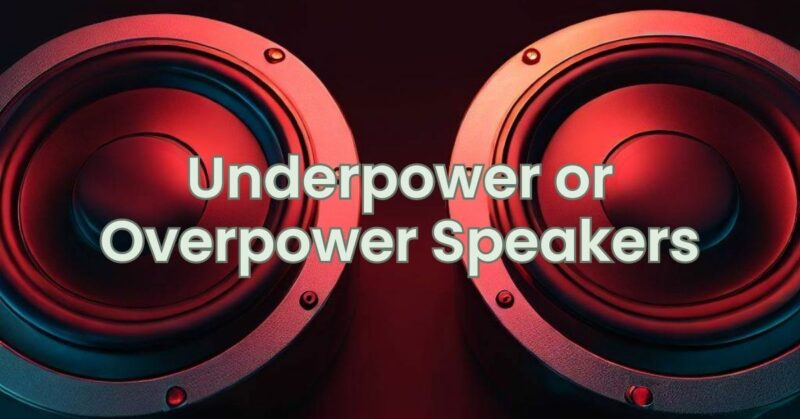When it comes to choosing an amplifier for your speakers, there are two main schools of thought: overpower or underpower. There are pros and cons to both approaches, so it’s important to weigh your options carefully before making a decision.
Overpowering Speakers
Overpowering speakers means using an amplifier that is more powerful than the speakers themselves. This can have a number of benefits, including:
- More volume: Overpowered speakers can produce louder sound than underpowered speakers. This is ideal for people who like to listen to their music at high volumes.
- Better bass response: Overpowered speakers can produce deeper bass than underpowered speakers. This is because the amplifier has more power to drive the woofers.
- Less distortion: Overpowered speakers are less likely to distort than underpowered speakers. This is because the amplifier has more power to handle the demands of the speakers.
However, there are also some potential drawbacks to overpowering speakers, including:
- Increased cost: Overpowered amplifiers tend to be more expensive than underpowered amplifiers.
- Potential for speaker damage: If an amplifier is too powerful for the speakers, it can damage them. This is because the amplifier can push the speakers beyond their limits.
Underpowering Speakers
Underpowering speakers means using an amplifier that is less powerful than the speakers themselves. This can have a number of benefits, including:
- Lower cost: Underpowered amplifiers tend to be less expensive than overpowered amplifiers.
- Less risk of speaker damage: Underpowered amplifiers are less likely to damage speakers than overpowered amplifiers.
- More headroom: Underpowered amplifiers have more headroom than overpowered amplifiers. This means that they can handle louder volumes without distorting.
However, there are also some potential drawbacks to underpowering speakers, including:
- Lower volume: Underpowered speakers can produce lower volumes than overpowered speakers. This is not ideal for people who like to listen to their music at high volumes.
- Poor bass response: Underpowered speakers can produce poorer bass response than overpowered speakers. This is because the amplifier does not have enough power to drive the woofers.
- More distortion: Underpowered speakers are more likely to distort than overpowered speakers. This is because the amplifier is working harder to drive the speakers.
So, Which Is Better?
So, which is better: overpowering or underpowering speakers? The answer depends on your individual needs and preferences. If you want to be able to listen to your music at high volumes and you don’t mind spending a little more money, then overpowering speakers is the way to go. However, if you’re looking for a more affordable option and you don’t mind sacrificing some volume and bass response, then underpowering speakers is a good choice.
Ultimately, the best way to decide is to experiment with different amplifiers and speakers to see what sounds best to you.


